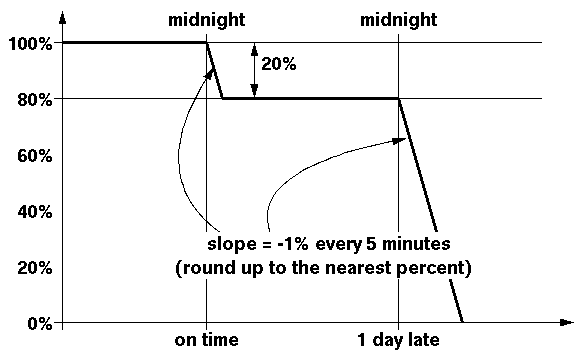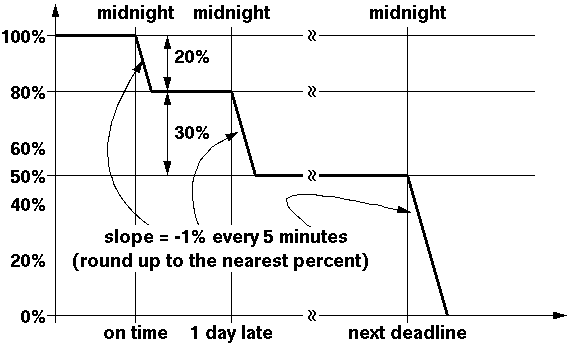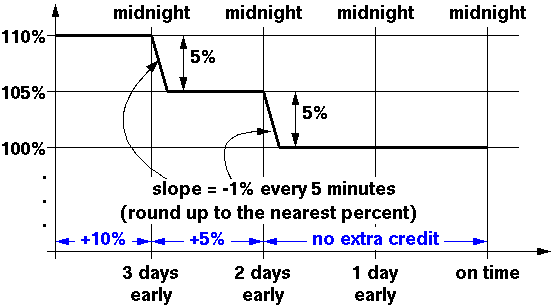
|
Course Description - CSCI 402, Summer 2014, MW Section |
|||||||||||||||||||||||||||||||||||||||||||||
|
Links to sections on this page:
|
|||||||||||||||||||||||||||||||||||||||||||||
| Focus | |||||||||||||||||||||||||||||||||||||||||||||
| This is a senior-level undergraduate class in computer operating systems. We will cover the principles underlying the design of various subsystems of modern operating systems, ranging from process management and virtual memory to file systems and security. Instruction in these principles will be augmented a series of projects in which students develop these subsystems within the context of an instructional operating system. | |||||||||||||||||||||||||||||||||||||||||||||
| Textbooks | |||||||||||||||||||||||||||||||||||||||||||||
Required:
Recommended resources:
|
|||||||||||||||||||||||||||||||||||||||||||||
| Syllabus / Topics Covered | |||||||||||||||||||||||||||||||||||||||||||||
The following schedule and topics are tentative and are subject to change
without notice.
|
|||||||||||||||||||||||||||||||||||||||||||||
| Homework Assignments | |||||||||||||||||||||||||||||||||||||||||||||
|
At the end of very book chapters, there are exercises.
Students should treat them as practice problems to get ready for exams.
These exercises will not be collected or graded, but students are encouraged to work on them. |
|||||||||||||||||||||||||||||||||||||||||||||
| Projects | |||||||||||||||||||||||||||||||||||||||||||||
|
You will be expected to complete a sequence of kernel programming
assignments which develop various components of a real operating system:
process management, file systems, and virtual memory.
All projects will require a fairly strong background in C programming, which you are expected to pick up on your own. There will be 1 to 2 warmup programming assignments at the beginning of the semester to make sure that you are up to speed with C and doing multi-threading in C. All kernel programming assignments are extremely difficult. You can do these assignments in teams of two or three students. Since the kernel programming assignments are interrelated, you must pick a team at the beginning of the semester and stick with the team till the end of the semester. If you'd prefer, you can do the kernel assignments by yourself. For more information, please see the projects web page. |
|||||||||||||||||||||||||||||||||||||||||||||
| Exams | |||||||||||||||||||||||||||||||||||||||||||||
A midterm and a final examination will be given.
The date of the midterm examination will be posted near the
top of the class home page.
The date of the final examination is firm and it is also listed near the
top of the class home page.
Any scheduling conflicts regarding the midterm exam date must
be resolved with the instructor at least one week
before the exam date.
Exam QuestionsI often get questions such as (1) can I get a copy of an old exam and (2) what types of questions should I expect? The answer to question (1) is "no". I'm sorry, but I do not give out old exams. That's just my policy. The answer to question (2) is the following.There are three types of exam questions that I usually ask. The first type is a calculation-type question. Pretty much anything that can be calculated/computed by running an algorithm can be asked in an exam. For example, I can ask you to compute a schedule using a particular scheduling algorithm. I can also ask you about what a data structure (e.g., tree, hash table, etc.) would look like after certain operations have been performed on it. Usually, for this type of questions, you must get the answer right and there is not much room for partial credits. The second type is multiple-choice questions. Unless specifically noted, every multiple choice questions has one or more correct answers. Please check all the correct ones and don't check any of the incorrect ones. There is a penalty for selecting incorrect answers (you will lose 1 point for every such selection). Please note that an incorrect statement can never be a correct answer (unless the question asks you to select statements that are incorrect). The scoring of multiple-choice questions is as follows. Multiple-choice questions are worth 2 points each and you are given 5 selections for each such question. It can have 1 to 4 correct answers. If a multiple-choice question has 1, 2, or 4 correct answers, for each correct answer that you have selected, the number of points you will get would equal 2 divided by the total number of correct answers. If it has 3 correct answers, you will get 1 point for selecting one of the correct answers and you will get 0.5 point each for selecting additional correct answers. Therefore, if you mark all the correct answers and don't mark any of the incorrect answers, you will get 2 points. But if you have selected incorrect answers, we will subtract 1 point for each such selected. In the end, if the total score for a problem is below zero, a score of zero will be assigned. Let's look at a concrete example. If a problem has 3 correct answers and you selected 2 correct ones and one incorrect one. You will get 1.5 points for the correct answers and -1 point for the incorrect answer. So, you will end up with 0.5 point. On the other hand, if you have only selected one of the correct answers and didn't select anything else, you will end up with 1 point. The third type is to ask you to give the best answer for a word question. (If a question says, "In N words or less...", it's giving you a hint that the answer should be N words or less. You don't have to answer in N words or less.) For this type of question, you get credit for including the "best answer". You may get deductions for including "bad answers". What you need to demonstrate is that you can distinguish between answers of different quality and write down the best answer. (For these questions, there is no need to write complete English sentences when you answer exam questions. Just give me the important stuff!) Let me give a couple of silly examples (with questions that's not in the scope of any exam).
Weenix QuestionsIf a question does not mention weenix explicitly, you must not give a weenix-specific answer. Most weenix-related questions are mostly high-level questions, testing about your understanding of weenix. Although I may ask you about the purpose and usage of a specific field inside a particular important kernel data structure.Lecture SlidesIf a lecture slide has a grey X in the lower left hand corner, I will not ask questions from that slide. If a lecture slide does NOT have the grey X, then it's possible that I will ask questions from that side (you need to figure out if it's LIKELY that I will ask questions from that slide or not; please do not ask me whether a particular slide is likely or not because I won't give you an answer for it).Exam GradingIn order to be fair to the entire class, we can only grade based on what you put down on the exam paper. We must not take into consideration what's in your mind when you wrote your answers. We have to assume that you wrote what you meant and meant what you wrote.In general, better answers may score more points. If you give very high level and generic answer that's generally true or basically just repeat the question, you probably will get very little partial credit for it! You need to answer a specific question with a specific answer. On the other hand, if the question called for a general answer and the answer you gave only applies to some specific examples, you probably will get very little partial credit for your answer. You must not give examples to answer general questions. If I asked a question straight from the lecture slides, the best/correct answer is the one on the lecture slides. If you disagree with what's on the slides, you must complain when you are studying for the exam, i.e., before the exam. Once the exam starts, it's too late to complain that you don't like the answer on the lecture slides. In an exam, if you give an answer that's different from the lecture slides, you may receive partial credits, at the discretion the TA. |
|||||||||||||||||||||||||||||||||||||||||||||
| Grading | |||||||||||||||||||||||||||||||||||||||||||||
The grading breakdown is as follows:
Two methods will be used to calculate your final letter grade: Your class letter grade will be the higher grade based on (1) or (2). Please also note the following:
|
|||||||||||||||||||||||||||||||||||||||||||||
| Late Policy | |||||||||||||||||||||||||||||||||||||||||||||
|
All project assignments must be turned in on time.
Late submissions will receive severe penalties. Due to clock skews,
electronic submissions of projects assignments will
be accepted within 15 minutes after the specified deadlines without
penalties.
For a project assignment,
if you submit within the next 24 hours, you will receive 80% of your grade.
Although right after midnight of the submission deadline,
you will lose 1% every 5 minutes.
When the penalty reaches the day limit, it flattens out.
For example, if your submission has a timestamp that is 32 minutes after
the grace period, 7% will be deducted from your assignment after grading;
if your submission has a timestamp that is 1 day, 6 hours, 40 minutes,
and 1 second after the grace period, you will receive a score of zero
(and your assignment will not be graded).
The figure below summarize the deductions for warmup assignment 1, warmup assignment 2, and kernel assignment 3.
For kernel assignment 1 and kernel assignment 2, beyond one day late, you can still submit and receive a 50% deduction. This goes all the way to the next assignment submission deadline. The idea here is that since kernel 2 depends on kernel 1, if your kernel 1 is not working, you may end up spending all your time to get it to work in the next couple of weeks and have no time to work on kernel 2. This way, you still get 50% of your kernel 1 score and will enable you to complete kernel 2 also at a 50% deduction. The figure below summarize the deductions for kernel assignment 1 and kernel assignment 2. (Please note that this policy does NOT apply to kernel assignment 3.)
If you are unable to complete a assignment due to illness or family emergency, please see the instructor as soon as possible to get an extension. A doctor's note is required as proof of illness or emergency. In general, when you get sick, it's best to see a doctor and get a note just in case you may need it later. |
|||||||||||||||||||||||||||||||||||||||||||||
| Note From A Doctor | |||||||||||||||||||||||||||||||||||||||||||||
|
Recently, there has been a change in the policy at the
Student Health Center regarding giving a "note from the doctor"
for you to bring to a faculty
member so that you can be execused from deadlines. Basically,
they will not give you such a note any more.
What they would give you is an Authorization for Disclosure
of Medical Information form. With this form, you give them
permissions to discuss your illness with me.
So, if you visit a doctor at the Student Health Center, please make sure you fill out one of these forms, check the "limited discussion with faculty" checkbox, get it stamped, signed, and dated by someone there (a clerk/receptionist would sign at the "witness" line), and bring it back to me. This would satisfy the "note from a doctor" requirement so that you can get an extension. If you visit a doctor somewhere else, please either bring a "note from the doctor" or a similar authrozation letter so I can contact them. |
|||||||||||||||||||||||||||||||||||||||||||||
| Regrading Policy | |||||||||||||||||||||||||||||||||||||||||||||
Assignment RegradesAll requests to change grading of programming assginments must be submitted in writing within one week of the time the initial grade was announced to you. Requests must be specific and explain why you feel your answer deserves additional credit. A request to re-grade an assignment can result in the entire assignment being re-evaluated and as a result the score of any part of the assignment be increased or lowered as appropriate. Exam RegradesEach TA is required to use one standard when grading all the exams in his/her section. Therefore, regrade for exams is not about arguing for points but about whether the TA has made a mistake in grading or not. If you think the TA has made a mistake, you should write down (on the cover page of the exam) which problem/subproblem needs to be regraded and why you think the TA has made a mistake. Plese limit the description of your rationale to be only one sentence long. There is no need to discuss your answer or your rationale with the TA since the TA is required to grade entirely based on what you wrote on the exam paper (and thus must ignore everything you said during a regrade session). |
|||||||||||||||||||||||||||||||||||||||||||||
| Office Hours | |||||||||||||||||||||||||||||||||||||||||||||
|
My office hours are held two hours each week. Please feel free to come to chat
with me to clarify lecture material and get hints about programming assignments.
You do not need an appointment to see me during office hours.
If you need to see me outside of office hours, it's best that you make an appointment (and reserve a timeslot) so I can make sure to be in my office when you visit. Making an appointment is not a big deal! Just send an e-mail to me and tell me when you are available to meet and go from there. |
|||||||||||||||||||||||||||||||||||||||||||||
| Extra Credits | |||||||||||||||||||||||||||||||||||||||||||||
There are two ways to get extra credit in this class.
Please note that due to my fairness policy, I cannot offer any individual extra credit work. |
|||||||||||||||||||||||||||||||||||||||||||||
| Implicit Student Agreement | |||||||||||||||||||||||||||||||||||||||||||||
|
Unless otherwise specified, programming assignments and exams must be that of the individual student
(for group programming assignments, the work must be completely that of the group members).
It is often productive to study with other students. However, if any portions of the
programming assignments are found to be shared between two (or more)
students, zero credit will be given to all students concerned and all students
will be disciplined. This policy is in the interest of those students who
do their own work, which hopefully applies to all of you in this class.
This policy also holds for programming assignments. In this class, we will use sophisticated automated program checkers to detect cheating. Be aware that the program checkers have demonstrated very good results and are widely used within the academic community. Any student caught cheating will be given zero credit and will be disciplined. It is the students responsibility to submit their assignments electronically in time. For students who satisfied the prerequisite at other universities or through work experience, this course assumes that you understand data structures, basic algorithms, and UNIX programming. You should be able to write large programs in C. No special assistance or consideration will be offered if your background is inadequate. |
|||||||||||||||||||||||||||||||||||||||||||||
| Student Responsibilities | |||||||||||||||||||||||||||||||||||||||||||||
|
During the semester you are responsible for completing the assigned
readings, programming assignments, and exams.
You must keep up with the assigned readings. If you come to class without having read the chapter for the corresponding lecture, you're unlikely to learn anything at all from the lecture. In particular:
|
|||||||||||||||||||||||||||||||||||||||||||||
| Fairness | |||||||||||||||||||||||||||||||||||||||||||||
| The instructor must treat all students equally and cannot give special treatment to any particular student. Therefore, please do not ask special favors from the instructor because of your circumstances. This may seem unfair to you because you believe that your circumstances are special (understandably, everone does). But the rule the instructor must follow is that whatever he offers you, he must offer to the entire class. | |||||||||||||||||||||||||||||||||||||||||||||
| Auditing | |||||||||||||||||||||||||||||||||||||||||||||
| Auditing "unofficially" is not permitted for this class. | |||||||||||||||||||||||||||||||||||||||||||||
|
Most class related announcements will be sent through the
class Google Group.
Therefore, you are required to be a member of this group.
Please see instructions on how to get
on this group (you should do this as soon as possible).
Please do not ask the following types of questions in your e-mail:
Although this is not related to e-mails, it's a type of question I get often. Please do not ask this types of question:
|
|||||||||||||||||||||||||||||||||||||||||||||
| Academic Integrity Policy | |||||||||||||||||||||||||||||||||||||||||||||
| Please make sure you read the Academic Integrity Policy of this course. | |||||||||||||||||||||||||||||||||||||||||||||
| Academic Calendar | |||||||||||||||||||||||||||||||||||||||||||||
| A link to the USC Summer 2014 academic calendar is provided here for your convenience. | |||||||||||||||||||||||||||||||||||||||||||||
| Additional Resources | |||||||||||||||||||||||||||||||||||||||||||||
|
(These resources below are provided for your information.
Please note that the instructor has not read most of them.
Please use these resources at your own risk!)
Programming:
|
|||||||||||||||||||||||||||||||||||||||||||||


